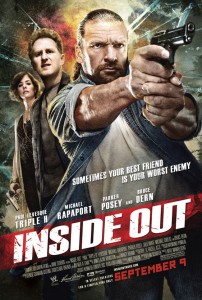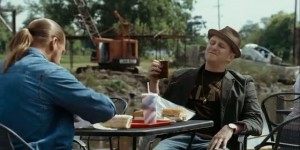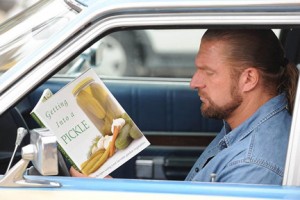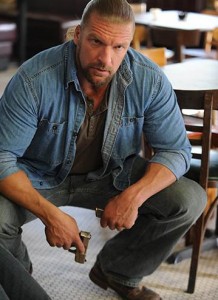
It’s a blessing that “Inside Out” has a good cast. Without professionals such as Michael Rapaport, Parker Posey and Bruce Dern, as well as a game Paul “Triple H” Levesque (no pun intended), the exiguous and barren script would drag this film down into purgatory. It doesn’t go down without a fight, as Dylan Schaffer’s shoddy dialogue does it’s best to make the characters look like buffoons.
For example, Claire Small (Parker Posey) explains to AJ (Triple H) that her marriage with Jack (Michael Rapaport) isn’t as good as it seems. They’re drowning in debt and private school payments for their daughter, Pepper (Juliette Goglia) and Jack’s father, Vic (Bruce Dern), is constantly riding his ass. This causes him to drink heavily, leading to an argument between the two. In it, Claire utters the line, “For an irritating drunk, you sure spend a lot of time drinking.” Wrap your head around that.
The Small family is involved in a counterfeit cigarette scheme, where they sell them directly to drug stores and gas stations for a hefty profit. Due to them being imported, Vic and company can receive all of the profit without paying taxes. This somehow also generates money for terrorists, according to Martha (Julie White), a cop who will stop at nothing to put Vic and his crew away, even if she doesn’t have much evidence or a clue.
Out of all of the characters, her’s is written the worst. I’m not sure if everybody else was written this poorly, as they seem to handle their dialogue and characteristics well. White, however, plays her role as a twelve year old would who has seen a few crime shows on television. She spouts out big words and babbles on incessantly, seemingly making things up as she goes along. When coming face to face with criminals, she acts tough, then quickly shrivels up and apologizes. It’s like watching a solo good cop/bad cop routine, except the bad cop is about as intimidating as Richard Simmons.
For those worrying that Triple H only has a small role in this film, don’t fret. He’s the main star of the film and gets the most screen time. Without him, the story would flounder (even more so), as there wouldn’t be an anchor to keep it afloat. He plays AJ, who has just been released from prison after a thirteen year sentence for manslaughter (an accidental homicide). This went down due to his involvement with the Small family, who treats him as such.
He’s been best friends with Jack since the second grade and was dating Claire before being locked up. Now out, Jack and Claire invite him to stay at their home, where uneasiness between him and Claire naturally follows. Jack and Vic want him to return to work with them, but he wants no part of it. He did his time and doesn’t want to risk going back to prison. He’d rather lay low and make pickles (you read that right).
AJ’s pickle fetish is another missile from Schaffer’s arsenal. What starts out as a quick excuse for AJ turns into an abominable running gag that’s only purpose has to be to sabotage the characters’ credentials. Scenes where AJ explains the fine art of pickle making and one in which involves him and the Small family salivating over pickles derails the film and makes one question their purpose.

It’s a shame the script is as abysmal as it is. There were quite a few times when I found myself becoming engaged into the film and, more importantly, the characters. When Schaffer focuses on the main story, that being Jack accidentally killing one of his clients (who is also a mole for Martha), the film moves smoothly. AJ has no choice but to get back into the game and clean things up for the safety of his reason and himself. This leads to some well directed action sequences by Artie Mandelberg that actually shows the action, as opposed to going haywire and putting us into them.
These few scenes help make Triple H look like an action hero, while Paul himself handles himself well. Not just on the battlefield, but during the story driven scenes, as well. He interacts nicely with Rapaport and Dern and is formidable when it comes to the sexual tension between him and Posey. There’s room for improvement, but he’s good at showing some range and handles himself better here than Steve Austin does. With some seasoning, he could be a very good film actor if he wanted to be.
Too bad this film and “The Chaperone” aren’t allowing him to break through the mold. He does his best in both film, but bad scripts keep weighing him down. In the case of “The Chaperone”, it was expected to be lighthearted and goofy, so it didn’t do too much damage. Here, he’s going for something more serious, yet gets shot in the foot (almost literally).

Final Rating: C
